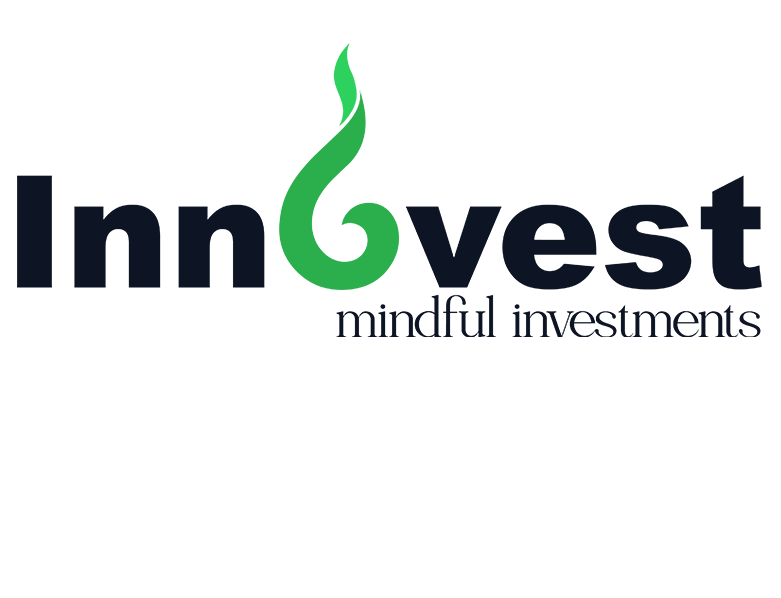-

-

Thimphu, Bhutan
Contact us
+975 17137777-
innovest > Announcements > Jabchor 2.0
Press Release Jabchor 2.0

Announcement
2 May, 2025
Innovest
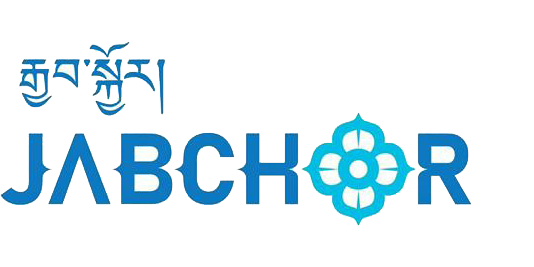
PRESS RELEASE

About Jabchor 2.0
Jabchor 2.0 Launches as Bhutan's Premier Equity Financing Platform
Jabchor 2.0 Launches as Bhutan’s Premier Equity Financing Platform
Connecting High-Potential Entrepreneurs with Investors for Sustainable Growth
Thimphu, Bhutan – The Department of Employment & Entrepreneurship (DoEE), Ministry of Industry, Commerce and Employment announces the launch of Jabchor 2.0, a transformative equity financing platform designed to fuel Bhutan’s entrepreneurial ecosystem.
1. What is Jabchor 2.0?
Jabchor 2.0 builds on the success of the original Royal Monetary Authority (RMA) initiative, which launched Jabchor 1.0 in 2018. Over four successful seasons (with Jabchor 1 & 2 organized by RMA and Jabchor 3 & 4 by Bhutan Chamber of Commerce and Industry (BCCI), the platform has supported 19 entrepreneurs across sectors like green businesses, tech solutions, trading, and manufacturing and raised Nu.36M through the platform.
This new iteration is initiated based on the directives received from the Honorable Prime Minister during the National Startup Weekend held in March 2025, and is supported by an advisory board comprising of DoEE, RMA, Royal Securities Exchange of Bhutan(RSEB), BCCI, Corporate Regulatory Authority (CRA), and Department of Industry (DoI), and is implemented by Innovest Private Limited. The project is funded through Economic Stimulus Programme, Government of India (GoI).
2. Why Equity Financing?
Many promising startups and growth-stage export oriented businesses in manufacturing, IT, services, and green sectors lack collateral for traditional loans. Equity financing offers an alternative:
*Investors provide capital in exchange for ownership stakes.
*Beyond funding, entrepreneurs gain mentorship, business networks, compliance guidance, and market access to scale their ventures.
3. What’s New in Jabchor 2.0?
*Expanded Reach: Open to businesses at idea, startup, and growth stages business with export potential (including those requiring over Nu. 10M funding).
* Business Incorporation: Legal safeguards for investors and entrepreneurs.
* FDI Participation: Foreign investors can now participate, with support from the Department of Industry.
*Exit Strategy: Investors can exit via RSEBL’s Alternative Investment Market (AIM) Board, with long-term potential for IPOs.
*Post-Investment Support: 6–12 months of handholding by Innovest for compliance, coaching, and growth.
4. Benefits for Entrepreneurs & Investors
Entrepreneurs get:
✅ Vetting by RAA-certified auditors
✅ Grooming for growth strategies, prospectus development, and pitching
✅ Access to local and global investors
Investors gain:
✅ Opportunities in high-growth, impact-driven sectors
✅ Legal safeguards (business incorporation via CRA)
✅ Contribution to Bhutan’s economy and Gross National Happiness
5. Who Can Participate?
*Idea-stage businesses ( pilot sales with export potential)
*Startups (1+ year operation, <Nu. 10M sales with profits)
*Growth-stage businesses (5+ years operation, >Nu. 10M sales with profits)
Priority sectors: Manufacturing, IT/ITES, green businesses, and export-oriented ventures. Import and resell in Bhutan businesses are not allowed.
6. How the entrepreneurs will be selected?
All registered entrepreneurs must attend the mandatory three-day bootcamp (May 19-21) for training in valuation, compliance, and financial verification. The advisory board will then select the top 10 performers based on stage-specific criteria: pilot sales for idea-stage ventures; operational history, financials, and market position for startups/growth-stage businesses; plus innovation and scalability for all. This rigorous process ensures only the most viable ventures advance to the June 25 Pitch Day for investor consideration.
7. Program Timeline
All registered entrepreneurs must attend the mandatory three-day bootcamp (May 19-21) for training in valuation, compliance, and financial verification. The advisory board will then select the top 10 performers based on stage-specific criteria: pilot sales for idea-stage ventures; operational history, financials, and market position for startups/growth-stage businesses; plus innovation and scalability for all. This rigorous process ensures only the most viable ventures advance to the June 25 Pitch Day for investor consideration.
8. How to Register?
Entrepreneurs and investors can apply at www.jabchor.bt from May 2–17, 2025.
Pitch Day Venue : To be Announced On the Website
Quotes
“RSEBL’s AIM Board offers investors a clear exit pathway, making equity investments in Bhutanese startups more attractive and liquid.”
“The Department of Industry fully supports Jabchor 2.0’s FDI component, which aligns perfectly with Bhutan’s investment policies. This creates new opportunities for cross-border partnerships while ensuring compliance with our regulatory framework.”
Media Contact
Email: info@jabchor.bt
Phone: +975 17120333
Website: www.jabchor.bt
Jabchor 2.0 Powering Bhutan's Entrepreneur-Investor Ecosystem
-Sonam Tina
I am Tina, and I graduated with a Bachelor of Arts in English Studies from Royal Thimphu College. I joined Innovest Private Limited soon after graduation and had the chance to be part of Jabchor 2.0, an equity financing platform implemented by the Department of Employment and Entrepreneurship under the Ministry of Industry, Commerce, and Employment as a Program Associate.
This was my first real experience in the professional world, and getting involved in such projects helped me understand how things worked on the ground. I supported the team, learned new things, and saw how ideas turned into action. This has been a great starting point in my career, and I look forward to learning more as I continue with Innovest. In the sections that follow, I’ll share what I’ve learned so far about the work, the people, and the overall experience.
Read More
About my journey in Innovest Private Limited
When I joined the company, I was immediately a part of Jabchor 2.0 as a Program Associate, and it gave me a front-row seat to understand how much effort went into making a program successful.
We had two months to put everything together, and the Innovest technical team, mainly Mrs. Sonam Choden and Mr. Jigme Tenzin, were engaged to the core. They worked tirelessly, putting in late evenings, weekends, and with no breaks. Their commitment was remarkable. I learned how much passion and discipline it took to keep a program running smoothly, which left a lasting impression on me.
I had the opportunity to be the MC at several key events, starting from the Jabchor Bootcamp to Pitch Day. Though it was nerve-wracking at first, it was also exciting to step up and grow more confident with each event. Furthermore, it was such a fun experience getting to meet and co-host with fellow MCs Zara and Samten. Coming from diverse fields, we each brought something unique to the stage, and it made the whole experience engaging and enjoyable.
Additionally, I got to interact with professionals like Mr. Michael, Mr. Thinley, and Mr. Ngawang from Rinzing Financials throughout the program, which added a new dimension to the experience. Working with experts in their fields gave me insight into the level of discipline and sharp thinking needed to make things happen.
Jabchor 2.0 - About Bhutan’s Entrepreneurial Ecosystem
Being a part of Jabchor 2.0 was an eye-opening experience. This program, Bhutan’s main equity financing platform, recently achieved a significant milestone: 15 MOUs were signed between 8 local entrepreneurs and private investors. Witnessing this firsthand made me realize the energy and potential building in Bhutan’s startup ecosystem.
The initiative is led by the Department of Employment and Entrepreneurship under the Ministry of Industry, Commerce, and Employment and is funded by the Government of India. Its main goal is to connect early-stage Bhutanese entrepreneurs with investors through a carefully designed investment readiness pipeline. Innovest, where I work, handled the technical aspects, managing the entire process from start to finish.
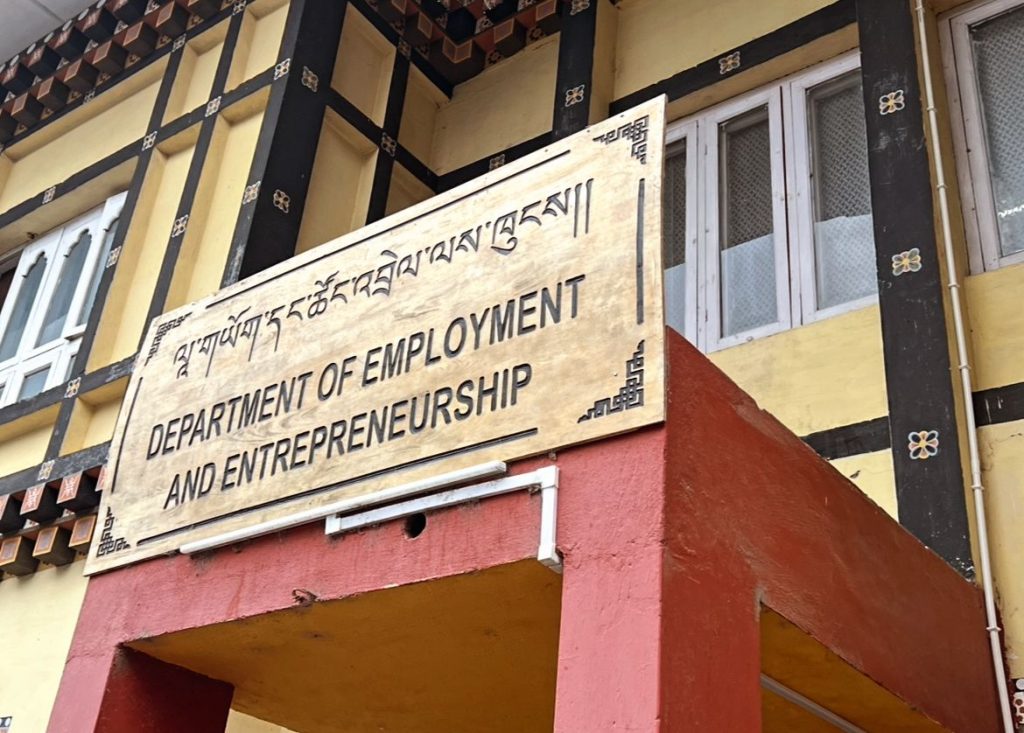
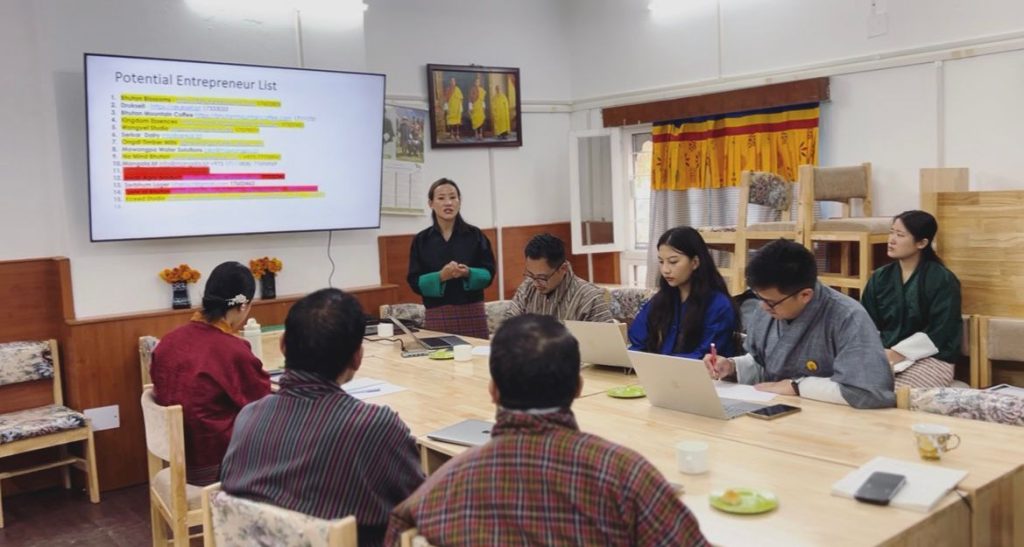
What struck me the most was the teamwork and support behind the scenes. The program had strong backing from key players like the Royal Monetary Authority, Corporate Regulatory Authority, Department of Industry, Royal Securities Exchange of Bhutan, and Bhutan Chamber of Commerce & Industry. Their involvement ensured everything aligned with policies, was thoroughly checked, and was credible. This helped build trust between entrepreneurs and investors.
Being part of Jabchor 2.0 was exciting, especially to witness local businesses receive the attention and support they deserve and to know I’m part of something that is making it happen.
What is Equity Financing?
Before joining the company, I was only familiar with debt financing and didn’t fully understand how equity financing worked or why it’s often preferred in the entrepreneurial world. Now that I have learnt more, I see equity as a powerful tool for entrepreneurs to access capital without the pressure of immediate repayments. It also helps build strong partnerships for the future.
Equity financing raises capital by selling shares or ownership of a company to investors. In return for funding, investors gain ownership stakes in the business and typically share in its future profits and growth. This differs from debt financing, where a company borrows money and must repay it over time with interest, without giving up ownership.
For example, if a startup needed Nu. 100,000, it can either take a loan and repay it monthly regardless of performance, or it can offer a percentage of its ownership to an investor in exchange for that amount. Therefore, I believe that equity financing is a better option for early-stage companies. It eases the immediate financial burden and lets founders reinvest cash flow into growth instead of repayments. Although it involves giving up some control, the collaboration and long-term alignment with investors can be more beneficial than the short-term security of a loan.
Since I started engaging with entrepreneurs for Jabchor—whether through workshops or outreach them using the ESP-acquired contact list—I had the privilege to closely observe the onboarding process. From which, I had noticed many entrepreneurs who were reluctant to give up shares or ownership in their businesses. They often wanted to keep full control and focus on personal profit over long-term growth.
However, I believe that if the Bhutanese entrepreneurs looked beyond short-term profit and control, they would realize that equity financing can bring valuable partners. These partners offer not just funding, but also expertise, networks, and long-term value that can significantly speed up business growth.
Jabchor
Version One
Jabchor 1.0 builds on the success of the Royal Monetary Authority initiative that launched in 2018
Over two successful seasons, organized by RMA, and Jabchor 1.3 and 1.4 by the Bhutan Chamber of Commerce and Industry, the platform had supported 19 entrepreneurs across various sectors like green businesses, technology solutions, trading, and manufacturing, raising a total of Nu. 36 million.
Jabchor Version Two (2.0)
This second version of Jabchor started based on directives from the Honorable Prime Minister during the National Startup Weekend held in March 2025. It is backed by an Advisory Committee that includes the DoEE, RMA, Royal Securities Exchange of Bhutan, BCCI, Corporate Regulatory Authority, and the Department of Industry. The implementation is led by Innovest Private Limited, with funding provided through the Economic Stimulus Programme by the Government of India.
This year’s Jabchor 2.0 initiative, led by the DoEE, builds significantly on the foundation of the original Jabchor program launched by the RMA. Designed to promote entrepreneurship, innovation, and alternative financing through both local and foreign direct investments, Jabchor 2.0 includes several key enhancements that expand its reach and deepen its impact:
· Jabchor 2.0 supports a broader range of entrepreneurs, including early-stage ventures like Idea stage, Start-up stage, and Growth stage with high-export potential.
· It actively involves both local and international investors to increase funding sources and create various investment opportunities.
· Investors can exit via RSEBL’s Alternative Investment Market (AIM) Board, with long term potential for IPO’s.
· The program offers support that lasts three to twelve months. It covers legal incorporation, strategic investment use, export market development, and IPO preparation.
Together, these advancements make Jabchor 2.0 a more integrated and impactful program that strengthens Bhutan’s entrepreneurial ecosystem, accelerates economic development, and aligns with the nation’s goals for innovation and sustainable progress.
From Training to Triumph: A Look Inside
the Program
Jabchor 2.0 launched in May 2025, and from the start, I was part of the excitement behind the scenes. It was thrilling to watch the program come to life and see the energy and effort that went into creating something meaningful for Bhutanese entrepreneurs.
It all began with a 3-day Bootcamp from May 26 to 28, where 20 selected entrepreneurs came together to build their foundations. They received practical training in business modeling, financial planning, and pitch development. I remember those three days as energetic, intense but full of learning and excitement. On the final day, the technical team scored the ventures, with 80% coming from their assessments and 20% from the advisory committee. The Top 10 were chosen to move forward to the investment phase.
That’s when things took off. The finalists went through mentorship sessions, investor onboarding, and hands-on business clinics to help them refine their pitches and strategies. Leading up to the final event, we organized a series of preparation sessions:
– Grooming Day on June 2nd
– Mock Pitch Day I on June 19
– Virtual Pitch Day on June 23
– Mock Pitch Day II on June 24
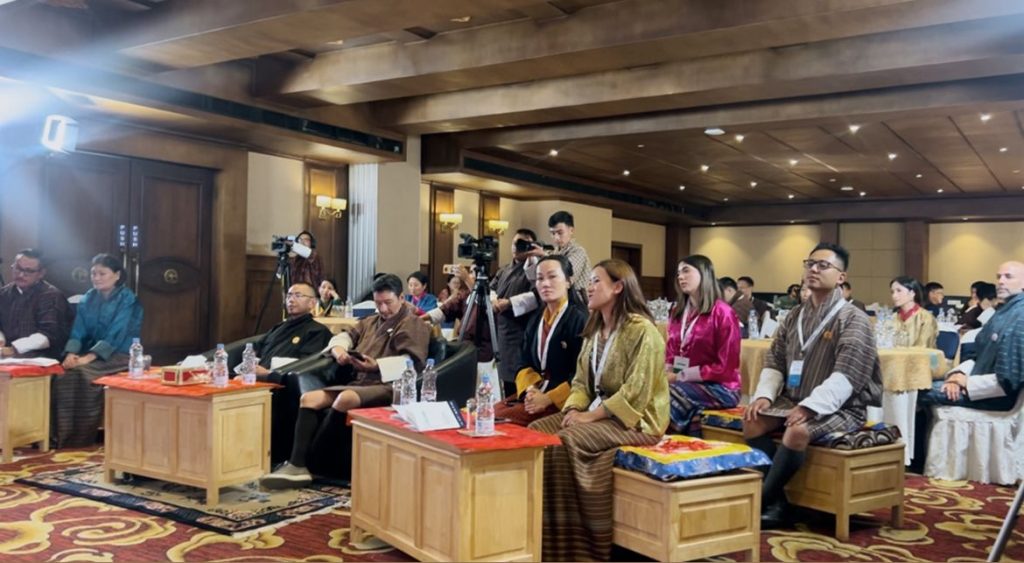
Finally, the big day—Final Pitch Day—arrived on June 25, 2025. The Top 10 entrepreneurs pitched live in front of a room full of private and institutional investors. Watching everything unfold after weeks of preparation was incredible. By the end of the day, 15 MOUs were signed, with 8 ventures attracting real interest, partnerships, and potential funding.
Key partners for the success of
Jabchor 2.0
Of course, none of this would have come together without the support of our fantastic partners. Each played a key role in making Jabchor 2.0 successful:
– Environ Legal Consultancy provided essential legal guidance.
– Rinzing Financials managed accounts and audits with sharp attention to detail.
– Samuh Mediatech helped us capture and share the program’s story through their media coverage.
– Wangyel Studios enhanced the visual appeal with their design and branding work.
Working alongside these teams made me appreciate how many parts go into a program like this and how collaboration truly makes a difference.
Behind the Curtain: Challenges of the Program Execution
While Jabchor 2.0 was undeniably successful in driving investment interest and supporting Bhutan’s growing startup ecosystem, bringing the program to life had its challenges:
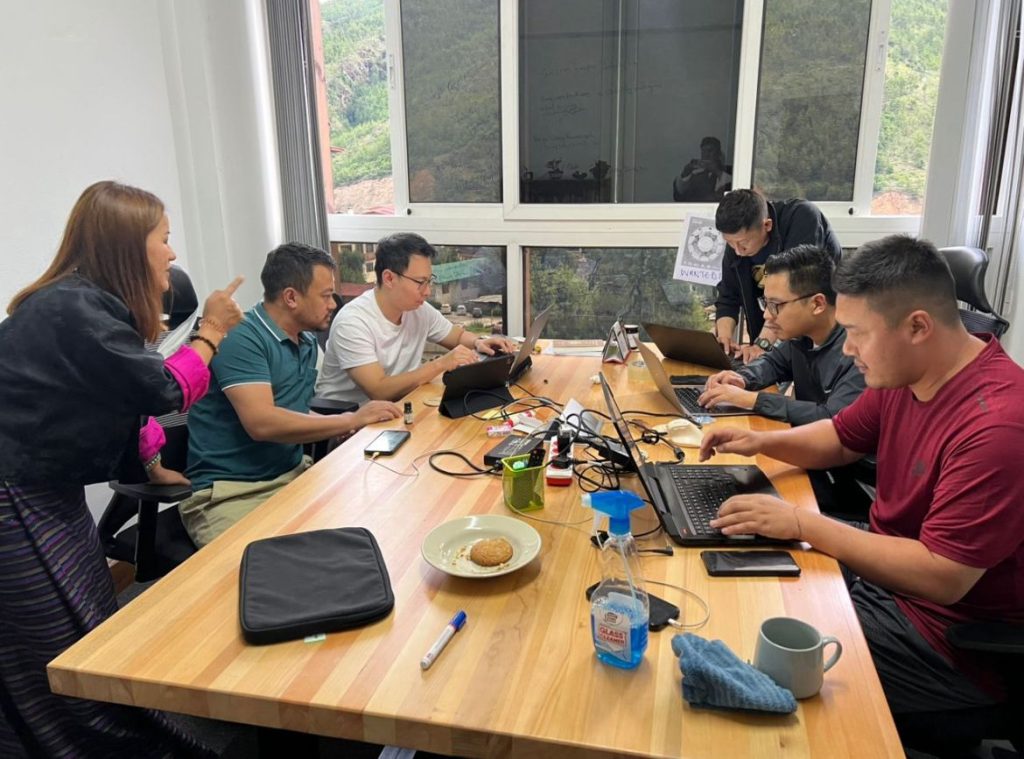
● One significant issue we faced was the lack of proper financial bookkeeping among many participating entrepreneurs. Without consistent records, the valuation and audit phases became more difficult than expected, which often slowed down investor confidence and due diligence.
● Another tough moment came when several investors dropped out at the last minute, despite earlier confirmations. This affected the variety of opportunities available on Pitch Day and decreased the competitiveness we had hoped to maintain.
● Even though over 80 people attended the Final Pitch Day, only 21 NDAs were signed, resulting in 15 MOUs. Interestingly, most of those deals came from repeat investors making multiple commitments rather than a broader mix of new investors. This reminded us that building a wider investor network is still a work in progress.
● Perhaps the biggest challenge was that the program was initially designed to run over six months, but due to scheduling changes, we only had two months to bring everything together. This meant shorter windows for mentorship, tighter preparation timelines, and very little breathing room.
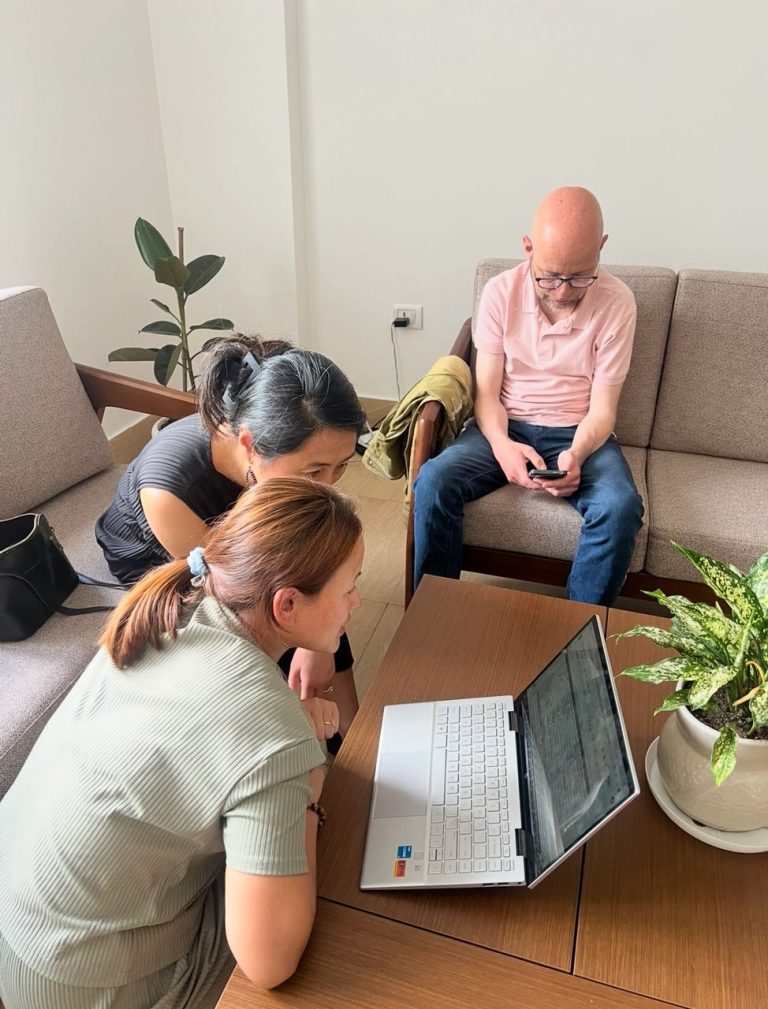
Despite it all, these challenges taught us a lot. Honestly, seeing what the team accomplished under those circumstances was inspiring.
Outcome of Jabchor 2.0
Despite the challenges, Jabchor 2.0 still delivered meaningful outcomes that we’re proud of:
● Thanks to NewEdge Technologies, we had reliable Starlink internet connectivity during the Virtual Pitch Day. This ensured smooth participation from remote founders and investors—a small detail that made a big difference.
● Another highlight was that all ten entrepreneurs signed MOUs with Innovest, committing to continue working with us even after the program ended. This demonstrated trust and a shared belief in long-term support.
● We also made progress on the legal side. Power of Attorney documents were signed, granting Innovest and other relevant parties the authority to facilitate investment closures efficiently—something that often slows down early-stage investing.
Beyond the numbers and deliverables, Jabchor 2.0 helped highlight deeper issues in the ecosystem, especially regarding financial management and investor readiness. While we still have a long way to go, the experience laid a strong foundation for future programs and brought us closer to building a more resilient, investment-ready private sector in Bhutan.
Way Forward
Although Jabchor 2.0 officially concluded, the journey is far from over. Behind the scenes, we’ve created a dynamic dashboard that outlines every next step, guiding us through the post-program phase. We’re actively working on providing ongoing support, ensuring entrepreneurs don’t just get a one-time boost but have the resources and guidance they need as they grow
There’s still much more to do: strengthening investor relationships, refining business models, and assisting ventures as they navigate challenges while scaling. Each day feels like a new chance to learn, adjust, and move forward. Jabchor 2.0 may have reached its finish line, but for us and the entrepreneurs involved, it’s just the beginning of a longer, exciting journey.
Conclusion
Being part of Jabchor 2.0 has been more than just a program—it has been a journey of hope, resilience, and faith in Bhutan’s future. Watching passionate entrepreneurs take bold steps toward their dreams, despite challenges and uncertainties, reminded me that real change starts with courage and commitment.
This experience has shown me that building a thriving entrepreneurial ecosystem isn’t just about funding or policies—it’s about people coming together, supporting each other, and daring to imagine what is possible. As we move forward, I am inspired by the determination I’ve witnessed and hopeful for the impact these ventures will continue to make.
Jabchor 2.0 may have ended, but its spirit lives on in every entrepreneur who keeps pushing, every mentor who offers guidance, and every investor who chooses to believe. Together, we’re shaping a future where innovation thrives and Bhutan’s dreams become reality.
